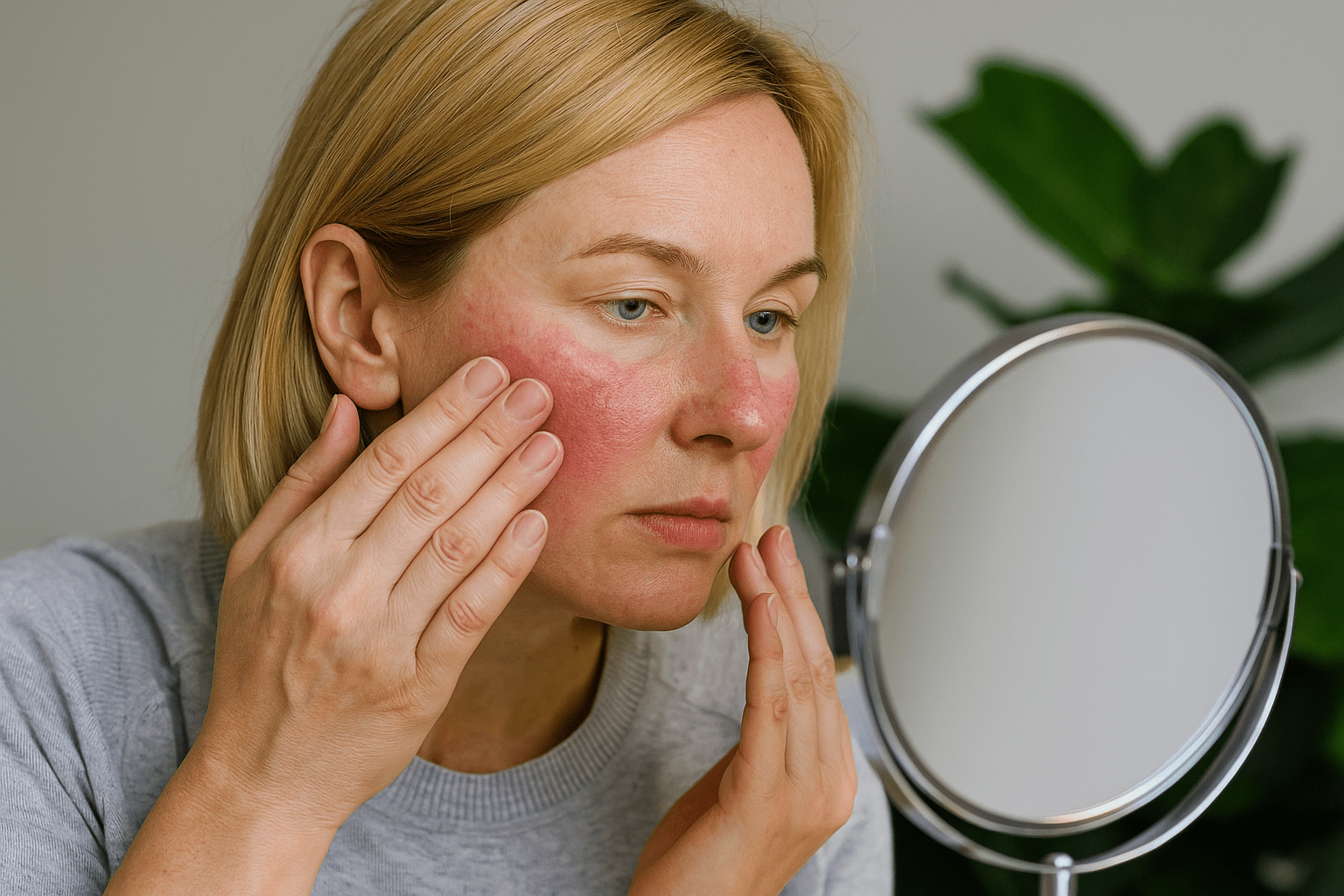7 Surprising Ways Leaky Gut Triggers Rosacea and Eczema
Struggling with rosacea or eczema can feel like an endless cycle: redness, itching, flare-ups with no clear cause. You try all the right things, but your skin still seems off. What if the real issue isn’t on your skin at all, but deep in your gut?
Leaky gut might sound like a wellness buzzword, but it’s a real condition with growing scientific support. And it turns out, your gut health might have more to do with your skin than you ever realized.
Let’s break it down. Here are seven unexpected ways your gut could be triggering those stubborn skin problems.
What Is Leaky Gut?
Imagine your gut lining as a fine mesh. It’s designed to let the good stuff through, like nutrients, while keeping harmful particles out. But with leaky gut, that mesh turns into more of a sieve. Tiny gaps form in the lining of your intestines, allowing things like toxins, bacteria, and undigested food particles to escape into your bloodstream.
Your body sees those escapees as invaders. So it does what it’s built to do: it fights back. The immune system kicks into gear, inflammation rises, and suddenly, you’re dealing with a whole-body response. The thing is, your skin is often one of the first places that response shows up.
This is what’s known as the gut-skin axis, and when it’s inflamed, your skin tends to react in ways that are hard to ignore.
7 Surprising Ways Leaky Gut Triggers Skin Conditions
Here’s where things get interesting. These aren’t random connections; they’re part of a complex system. Let’s walk through the key ways leaky gut can make skin conditions like rosacea and eczema worse.
1. Immune System Overload
When the gut lining breaks down, it lets in particles that should’ve stayed in the gut. These foreign particles trigger the immune system, and in response, your body floods with inflammatory chemicals like cytokines.
This systemic inflammation doesn’t just stay internal. It finds its way to the skin, fueling flare-ups and making conditions like leaky gut and eczema or leaky gut and rosacea even more persistent.
2. Skin Microbiome Gets Thrown Off
Your gut and your skin both have their own microbiomes: complex communities of bacteria that help keep things in balance. When the gut microbiome is disrupted, that imbalance can ripple outward.
Studies have shown that people with gut issues often have skin microbiome changes too. That means more bad bacteria on the skin, less of the good, and a barrier that’s less capable of protecting you. Suddenly, your skin becomes more reactive, and those flare-ups start to make a little more sense.
3. Good Bacteria Lose Their Power
Your gut is supposed to house a diverse mix of helpful bacteria. These good guys produce short-chain fatty acids (SCFAs), which help calm inflammation and strengthen the gut lining.
But when your gut is leaky, these helpful bacteria often start to disappear. Without SCFAs to keep inflammation in check, your skin can become more sensitive and prone to irritation. And it’s not just about breakouts; eczema and rosacea can both get worse in the absence of those anti-inflammatory helpers.
4. Oxidative Stress Increases
Leaky gut can lead to higher levels of oxidative stress, which is just a fancy way of saying your body is under pressure from unstable molecules called free radicals.
These molecules can damage cells all over the body, and the skin is especially vulnerable. That damage can show up as redness, peeling, or heightened sensitivity. In someone with eczema or rosacea, it can look like a full-blown flare-up that feels completely unmanageable.

5. Your Skin’s Triggers Multiply
When your system is already inflamed, it doesn’t take much to set it off. That heat from a hot shower? The dairy in your morning coffee? The stress of a bad day? All of these become stronger triggers when your body is already on edge.
With leaky gut and rosacea, this can mean frequent flushing, breakouts, or that uncomfortable stinging sensation. With eczema, it might show up as itchy patches that just won’t calm down.
6. Nutrients Stop Getting Absorbed Properly
One of the lesser-known effects of a leaky gut is nutrient malabsorption. You could be eating well, but your body might not be absorbing enough of the nutrients it needs to support healthy skin.
Here’s a quick look at how that can affect your skin:
Nutrient | Why It Matters for Skin | What Happens When It’s Lacking |
Zinc | Helps repair skin & fight bacteria | Poor wound healing, more breakouts |
Vitamin D | Regulates inflammation | Flare-ups, dry patches |
Omega-3s | Keep skin hydrated & calm | Increased redness, itchiness |
Protein | Builds the skin barrier | Weak or damaged skin surface |
With leaky gut, these nutrients might not make it where they need to go. And that can directly impact your skin’s ability to heal and defend itself.
7. Stress Signals Amplify Everything
The gut isn’t just tied to your immune system—it’s also deeply connected to your brain. This is the gut-brain-skin triangle, and it explains why stress often shows up on your face.
When your gut is inflamed, your nervous system becomes more reactive too. Stress hormones like cortisol increase, and the skin becomes extra sensitive. If you’ve noticed that emotional stress seems to make your skin worse, your gut might be playing a part.
Recognizing Leaky Gut Symptoms on Skin
Sometimes your skin is trying to send a message about what’s going on internally. Here are some signs that your skin issues might be linked to your gut:
- Flare-ups that happen alongside bloating or digestive discomfort
- Itchy, burning, or reactive skin with no clear trigger
- Skin that doesn’t improve even with topical treatments
- Patches that move around or change frequently
- Skin that feels inflamed deep down, not just on the surface
These may be signs of leaky gut symptoms on skin, especially if they happen in cycles or after eating certain foods.

5. Your Skin’s Triggers Multiply
When your system is already inflamed, it doesn’t take much to set it off. That heat from a hot shower? The dairy in your morning coffee? The stress of a bad day? All of these become stronger triggers when your body is already on edge.
With leaky gut and rosacea, this can mean frequent flushing, breakouts, or that uncomfortable stinging sensation. With eczema, it might show up as itchy patches that just won’t calm down.
6. Nutrients Stop Getting Absorbed Properly
One of the lesser-known effects of a leaky gut is nutrient malabsorption. You could be eating well, but your body might not be absorbing enough of the nutrients it needs to support healthy skin.
Here’s a quick look at how that can affect your skin:
Nutrient | Why It Matters for Skin | What Happens When It’s Lacking |
Zinc | Helps repair skin & fight bacteria | Poor wound healing, more breakouts |
Vitamin D | Regulates inflammation | Flare-ups, dry patches |
Omega-3s | Keep skin hydrated & calm | Increased redness, itchiness |
Protein | Builds the skin barrier | Weak or damaged skin surface |
With leaky gut, these nutrients might not make it where they need to go. And that can directly impact your skin’s ability to heal and defend itself.
7. Stress Signals Amplify Everything
The gut isn’t just tied to your immune system—it’s also deeply connected to your brain. This is the gut-brain-skin triangle, and it explains why stress often shows up on your face.
When your gut is inflamed, your nervous system becomes more reactive too. Stress hormones like cortisol increase, and the skin becomes extra sensitive. If you’ve noticed that emotional stress seems to make your skin worse, your gut might be playing a part.
Recognizing Leaky Gut Symptoms on Skin
Sometimes your skin is trying to send a message about what’s going on internally. Here are some signs that your skin issues might be linked to your gut:
- Flare-ups that happen alongside bloating or digestive discomfort
- Itchy, burning, or reactive skin with no clear trigger
- Skin that doesn’t improve even with topical treatments
- Patches that move around or change frequently
- Skin that feels inflamed deep down, not just on the surface
These may be signs of leaky gut symptoms on skin, especially if they happen in cycles or after eating certain foods.
Image: Morning Skin Glow.png
Alt text: Smiling woman stretching with glowing morning skin
The Gut-Skin Link
Science is finally catching up with what many holistic practitioners have suspected for years. Studies are showing real connections between the gut and the skin—especially when it comes to how gut health affects skin conditions like eczema and rosacea.
In recent years:
- Researchers have found that people with rosacea often have gut dysbiosis, or an imbalance in gut bacteria.
- Some studies have shown that treating gut issues with probiotics or dietary changes led to improvements in skin inflammation.
- There’s growing evidence that intestinal permeability is higher in people with chronic skin conditions.
While we still need more studies to understand the full picture, the link is strong enough that many dermatologists now refer patients to nutritionists or gastroenterologists as part of treatment.
Strategies to Support Gut and Skin Health
You don’t have to choose between gut health and skin health. In fact, supporting one almost always helps the other. Here are a few practical steps that can help restore balance:
Diet
- Add: fibre-rich foods (like leafy greens, chia seeds, berries), fermented foods (sauerkraut, kefir, yogurt), bone broth
- Avoid: excess sugar, refined carbs, alcohol, processed oils
Lifestyle
- Manage stress with gentle movement, mindfulness, and deep breathing
- Prioritize sleep to support skin regeneration and gut repair
- Get regular physical activity to boost circulation and gut motility
Supplements (talk to your healthcare provider first)
- Probiotics for gut balance
- L-glutamine to support gut lining repair
- Omega-3s for calming inflammation
You don’t need to overhaul your life overnight. Even small changes can help support the gut-skin axis inflammation and start easing symptoms.
Conclusion
Your skin might be showing signs of something deeper—something happening in your gut. Leaky gut can quietly fuel inflammation, trigger flare-ups, and slow down healing from the inside out.
If you’re stuck in the cycle of eczema or rosacea, it might be time to stop chasing surface fixes and start looking within. The gut could be the key.
Want support getting to the root? Explore our Longevity Program to start healing from the inside out.


